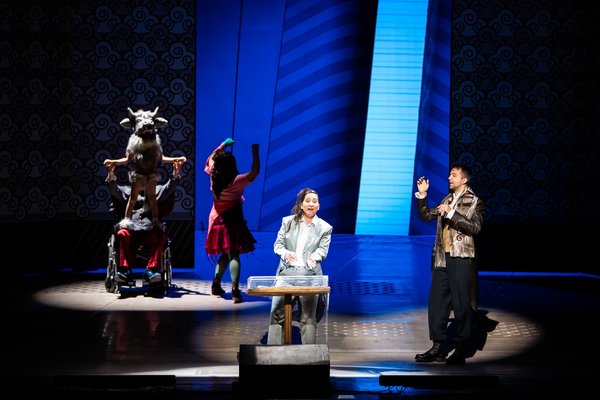
ARIADNE AUF NAXOS
23 June 2023, 7 p.m.
In Brief
Opera in one act with prologue, in German, with Hungarian, English, and German subtitles
"Music is a sacred art, gathering the wildest follies like cherubim around a gleaming throne!" - such is the Composer's article of faith proclaimed in the Prologue of Ariadne auf Naxos which is the most exciting opera of Richard Strauss and Hugo von Hofmannstahl. It playfully combines two very different art forms: tragic opera and romantic farce. The result is a richly textured work that examines the role of art in society, and contrasts true love with cheerful promiscuity. "We perform merriness and sadness, love and death simultaneously because we must live. And this is life itself. As these emotions are mixed in our everyday lives, now they will be mixed at the theatre too" – says the stage director, Ferenc Anger.
Details
- Location
- Hungarian State Opera
- Date
- June 23, 2023
- Start time
- 7 p.m.
- End time
- 9:15 p.m.
Synopsis
Prologue:
A nouveau riche Viennese gentleman wishes to entertain his dinner guests with two theatrical performances. First to be performed is Ariadne auf Naxos, a young composer’s magnificent opera, followed by a divertissement entitled The Faithless Zerbinetta and Her Four Lovers performed by a dancer and some clowns. The musicians, who are offended by this unworthy match, are even more shocked by the landlord’s decision: the two performances must be held simultaneously before the fireworks at nine. Fortunately, the resourceful dancer Zerbinetta has an idea of how to save the situation – the two pieces must be cut down so that they fit one another.
The opera:
On the island of Naxos Ariadne is lamenting her unfaithful lover Theseus. The nymphs try to console her in vain and the clowns cannot cheer her up either; she is waiting for the herald of death. When Zerbinetta attempts to persuade her to find, instead of death, consolation in the arms of the first appropriate man she meets, the indignant Ariadne withdraws to her cave. Thus, Zerbinetta may choose from her admirers undisturbed. Eventually, she bestows her favours upon Harlequin, and the other disappointed clowns slink off. The nymphs rush in with the news: a ship is approaching. Bacchus arrives, the handsome god of wine and ecstasy. The mournful Ariadne believes that Hermes, the herald of death, has come to take her to the underworld. She throws herself into his arms happily. Instead of death, however, the wonderful ecstasy of love pervades them both. Zerbinetta is satisfied: her advice did not go unheeded.
A nouveau riche Viennese gentleman wishes to entertain his dinner guests with two theatrical performances. First to be performed is Ariadne auf Naxos, a young composer’s magnificent opera, followed by a divertissement entitled The Faithless Zerbinetta and Her Four Lovers performed by a dancer and some clowns. The musicians, who are offended by this unworthy match, are even more shocked by the landlord’s decision: the two performances must be held simultaneously before the fireworks at nine. Fortunately, the resourceful dancer Zerbinetta has an idea of how to save the situation – the two pieces must be cut down so that they fit one another.
The opera:
On the island of Naxos Ariadne is lamenting her unfaithful lover Theseus. The nymphs try to console her in vain and the clowns cannot cheer her up either; she is waiting for the herald of death. When Zerbinetta attempts to persuade her to find, instead of death, consolation in the arms of the first appropriate man she meets, the indignant Ariadne withdraws to her cave. Thus, Zerbinetta may choose from her admirers undisturbed. Eventually, she bestows her favours upon Harlequin, and the other disappointed clowns slink off. The nymphs rush in with the news: a ship is approaching. Bacchus arrives, the handsome god of wine and ecstasy. The mournful Ariadne believes that Hermes, the herald of death, has come to take her to the underworld. She throws herself into his arms happily. Instead of death, however, the wonderful ecstasy of love pervades them both. Zerbinetta is satisfied: her advice did not go unheeded.
